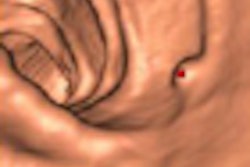Prostate cancer patients who receive external-beam radiation therapy had a higher risk of developing colon cancer during their lifetime, but the overall risk may be declining with new technology, Swiss researchers report in a study published in the International Journal of Cancer.
The good news is that their chance of developing rectal cancer is low. The better news is that newly diagnosed prostate cancer patients receiving radiotherapy may have better odds due to recent changes in treatment protocol and dose. However, the risks associated with external-beam radiation therapy should be discussed thoroughly with patients prior to treatment, according to the researchers.
Both the rectum and the bladder are irradiated fields during treatment for prostate cancer. However, other parts of the large intestine can receive substantial amounts of scattered radiation from the volume of irradiated tissue, according to lead author Dr. Elisabetta Rapiti of the Geneva Cancer Registry at the University of Geneva. In particular, these include the rectosigmoid junction, the cecum, and parts of the large intestine that are "mobile" in the abdomen (Int J Cancer, June 10, 2008).
Since 1970, the Geneva Cancer Registry has recorded all incident cancer cases occurring in the canton's population of 420,000. The researchers identified 1,134 men who were diagnosed between 1980 and 1998 and who survived five or more years after diagnosis and treatment. Men who developed colorectal cancer within five years after the prostate cancer was diagnosed were excluded, as were any men who had an earlier history of any type of invasive cancer, with the exception of skin melanomas.
The patients ranged from 44 to 93 years of age, with a median age of 71 years. None of the patients received brachytherapy during the 18-year study period. The majority, or 77%, did not receive radiation. Some 54% of the total 870 patients underwent prostatectomy, and 1.3% received chemotherapy. Patients were followed for 7.3 years.
Of the study group, 234 patients were treated with primary external radiotherapy. They had a median age of 68 years and their tumors were more often lymph-node negative, better differentiated, and smaller. These patients were followed for 7.8 years.
Categorical data evaluated included cancer incidence rates of the Geneva population from 1980 through 2003. Standardized incidence ratios were defined as the ratio between the observed and the expected number of cases. Medical records of the patients who received radiation therapy were evaluated with respect to radiotherapy regimen, technique, dose in Gy, duration, target volumes, fields, and number of cycles. The risk of developing colorectal cancer between patients who received high versus low radiation dose was also calculated.
A total of 19 patients who received radiation therapy developed colorectal cancer more than five years after being diagnosed with prostate cancer, and 13 were diagnosed with colon cancer, representing a fourfold increase in risk compared to the general population. Six were diagnosed with cancers of the rectum, a twofold increase in risk.
The authors noted that most of the 19 patients who developed colorectal cancer were treated in the first nine years of the study: 64% of the patients were treated between 1980 and 1989, while 36% were treated between 1990 and 1998. This could be evidence that newer radiation therapy techniques are reducing the incidence of radiotherapy-induced cancers. The authors acknowledged that their results may be historically accurate but not applicable to patients receiving radiation therapy today.
For example, the use of newer 3D conformal techniques reduces the effect of radiotherapy on different organs by directing multiple radiation beams at the prostate from several angles. The region of highest intensity of radiation is centered on the prostate, compared to earlier techniques in which a large volume of the bladder and the rectum received the same dose as the prostatic tumor target.
By Cynthia Keen
AuntMinnie.com staff writer
June 24, 2008
Related Reading
Salvage radiotherapy for recurring prostate cancer enhances survival odds, June 17, 2008
Radiation therapy for prostate cancer linked to secondary cancers, May 28, 2008
Disease-free survival, mortality uphold novel radiotherapies for prostate cancer, February 14, 2008
Statins may boost radiation efficacy in prostate cancer, October 30, 2007
Copyright © 2008 AuntMinnie.com

















